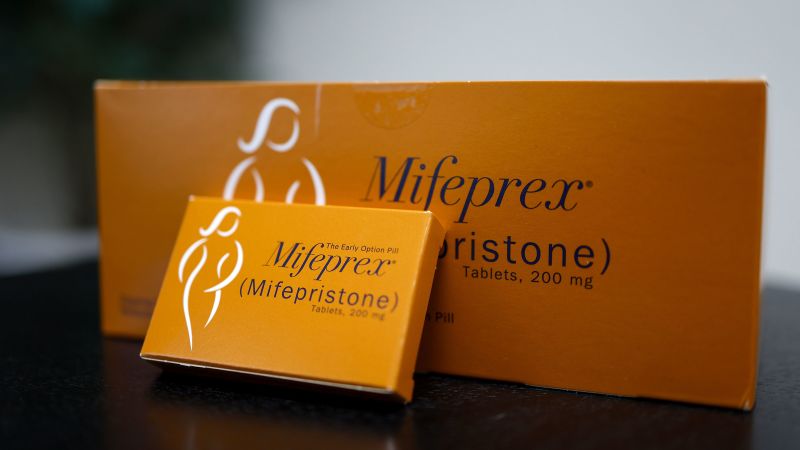

New Orleans
CNN
—
The roughly two hours of oral arguments that an extremely conservative appeals court heard Wednesday in a blockbuster abortion pill case suggested that the judges were not buying the Biden administration’s arguments for why courts should not second guess how the government has regulated a medication abortion drug.
The appeals court is considering whether to uphold a federal trial court’s opinion that would suspend the drug, mifepristone – the highest-stakes legal dispute over abortion since the Supreme Court overturned Roe v. Wade last year.
Wednesday’s hearing featured several tense exchanges between the three GOP appointees and lawyers for the Justice Department and Danco Laboratories, a manufacturer of mifepristone that is also defending its approval.
The stakes of the case are incredibly high, medication abortion is the most common form of abortion in the United States. The availability of abortion pills, and how the US Food and Drug Administration has made the drug easier to obtain via telemedicine, have been a crucial tool for abortion providers in states whether the procedure remains legal, as their clinics have been overwhelmed by out-of-state patients traveling from places where abortion is illegal or severely restricted.
The 5th Circuit is reviewing an April ruling from US District Judge Matthew Kacsmaryk that concluded the US Food and Drug Administration broke the law in how it approved the drug more than two decades ago. That ruling has been put on hold by the Supreme Court.
Here are takeaways from the hearing in New Orleans:
In what were some of the most critical comments by the judges, the appellate panel signaled that it was deeply skeptical the arguments put forward by the government and its supporters that the scientific decisions of the FDA should not be second-guessed by the courts.
Circuit Judge James Ho, who was appointed by Donald Trump, showed his hostility to the idea of giving the FDA deference right from the beginning of the hearing, when he interrupted DOJ attorney Sarah Harrington’s opening remarks to question why the department was describing Kacsmaryk’s opinion as “unprecedented.”
“I’m just wondering why not just focus on facts of the case rather than have this sort of ‘FDA can do no wrong’ theme?” Ho said.
Ho later suggested that it was not a “very pro-science, pro-information, pro-intellectual curiosity” position for the FDA to reduce some of the reporting requirements for when the drug had an adverse effects while it was also relaxing some of the requirements for obtaining the pills.
“I don’t understand this thing, ‘the FDA can do no wrong,’” Ho said at another point, as he ticked off unrelated controversies at the agency. “We are allowed to look at the FDA just like we’re allowed to look at any agency.”
Ho was not the only judge on the panel who was not willing to accept without scrutiny how the agency exercised its expertise in regulating mifepristone. Circuit Judge Cory Wilson, who was also appointed by Trump, grilled the Justice Department attorney on whether the FDA was obligated to consider how its regulations allowing for the mailing of the drug were making it possible for people in states were abortion was illegal to obtain the pill.
“If the FDA didn’t consider an important part of the problem, it is our role – correct? – to go behind the FDA and determine if what they did was arbitrary and capricious,” he said.
When the attorney for the anti-abortion doctors and medical associations challenging the drug’s approval, Erin Hawley, was up to argue, she faced plenty of pointed questions. But the tenor of the judges’ inquiries for her was much less heated, and the tough questions she received may have been their way of exploring how to rule against FDA and the Biden administration in a way that will protect that ruling when it is appealed up to the Supreme Court.
Much of their grilling of her focused on some of the wonkiest procedural issues in the case. The Justice Department is arguing that, even before the court gets to the merits of the abortion foes’ arguments, the case should be thrown out because of the threshold problems with the case, like the statute of limitations of the laws the challengers are using to challenge FDA’s actions.
The judges had a line of inquiry aimed at disentangling the challengers claims about why the way the FDA went about approving the drug was unlawful, with Circuit Judge Jennifer Walker Elrod, a George W. Bush-appointee, asking her questions about whether that claim had been made moot by later actions by the agency and Congress.
Wilson had Hawley elaborate on how the challengers are getting around the statute of limitations issues the DOJ argues they face. The anti-abortion doctors claim the FDA “reopened” the 2000 approval when it made changes to the how the drug can be used in 2016.
“Is every time the FDA is going to relax some prior restriction or requirement or safeguard, based on history of performance [of the drug], does that then mean we’re here on a reopening issue? I mean, how do you draw that line?” Wilson said.
The tone of those questions seemed to suggest the panel was working to dot its I’s and cross its T’s so that its decision can withstand a review by the Supreme Court. Often, when the high court wants to duck weighing in on a politicized and divisive issue, it will throw out a case for a procedural reason. Mifepristone’s defenders in the current litigation have focused on the supposed procedural flaws in the challengers’ case.
A large portion of the hearing was devoted to the question of standing, i.e. whether the challengers are at imminent risk of suffering the kinds of concrete, direct harms due to the FDA’s actions that make it appropriate for a court to intervene.
The appeals court judges did not seem to buy the Justice Department’s arguments for why the challengers did not overcome this threshold issue, though they did grill Hawley about the topic as well, asking her to point them to specific testimony in the record that backs the way she was describing their declarations.
DOJ attorney Harrington and Danco attorney Jessica Ellsworth both argued that, if you read closely the declarations submitted by the anti-abortion doctors in the case, none of them had provided the level of detail that showed that they were forced to perform – against their moral or religious convictions – surgeries to complete an abortion due to a medical emergency caused by an FDA-approved drug used in the fashion set out by the agencies’ rules.
The language in the declarations lacked the needed level of detail, Ellsworth argued, and were “generalized statements.”
The judges pushed back aggressively on her and Harrington’s claims about the declarations’ ambiguity, with Ho repeatedly reading from the declarations themselves.
Wilson appeared to embrace the challengers’ arguments that the FDA, by relaxing the rules around mifepristone’s use, increased the likelihood the anti-abortion doctors would see emergency patients suffering from mifepristone-related adverse effects.
“It just strikes me with what the FDA has done in making this more available and doing it by mail and order and removing the doctor visits, as well as the requirement that the provider be a doctor, is you’ve made it much more likely that patients are going to go to emergency care or a medical clinic where one of the doctors is a member,” Wilson told Harrington. “I don’t see how you can square that circle.”
The appeals court has the option of reversing the parts of Kacsmaryk’s ruling that would seek to pull mifepristone from the market while leaving in place the aspects of the ruling that would reverse the more recent regulatory moves by the FDA, effectively restoring certain requirements for the drug that would make it harder to access.
That is what a previous 5th Circuit panel – made up of a different set of judges – did during an emergency appeal of Kacsmaryk’s ruling, at an earlier stage of the litigation. But the Supreme Court ultimately put the entirety of Kacsmaryk’s ruling on hold several days later, with an order that will stay in place until the case is appealed again to the justices and they have another chance to weigh in.
There were some hints during Wednesday’s hearing that the current 5th Circuit panel was considering the possibility of another mixed ruling that would leave the approval of the drug in place but restore the FDA rules that made the pills more difficult to obtain.
The judges made some comments that suggested that they were at least open to the Justice Department’s arguments that the abortion opponents were time-barred from challenging the 2000 approval.
Elrod also grilled the drug company lawyer on what harms the manufacturer would face if the FDA was ordered to restore the more stringent rules for the drug. When the emergency litigation was at the Supreme Court last month, Danco argued the complexities of changing the instructions for mifepristone’s use under such a court order would take the drug off the market for at least several months.
While the Supreme Court’s emergency order was in effect, the judge asked Ellsworth, “you could get that all ready to go and so … how would you have an injury?”
After a rough first round of questioning for the DOJ’s attorney, Danco’s lawyer seemed to be having a smoother time getting the appellate panel to follow its arguments – until the final moments of her presentation, when Elrod brought up the rhetoric her team used in its briefs to describe Kacsmaryk’s opinion.
“There’s comments that the district court ‘defied long standing precedent,’ the court’s injunction was ‘an unprecedented judicial assault,’ the court’s ‘relentless one-sided narrative,’ the ‘non-expert’ court,” Elrod said, calling the rhetoric the kind of “remarks towards a district court that we normally don’t see from learned counsel.”
As Ellsworth tried to defend the language, Elrod jumped in again: “So you think it was appropriate to attack the district court personally in the case in that way?”
Ellsworth said the briefs weren’t intended as personal attacks and after more pressing from the judge, conceded, “With more time we may have ratcheted down some of that” rhetoric.
The 5th Circuit did not give any indication as to how quickly it would rule. During the proceeding, Elrod suggested she might need to see more evidence from the government – in the form of a so-called administrative record, or the set of information an agency had looked at when it made a regulatory move – as she pressed the parties on whether the court should have that “administrative record” in front of it before it rules.
Regardless of when the appeals court hands down its final ruling, the case will need to go back to the Supreme Court first before that ruling goes into effect. The emergency order from the justices last month pausing Kacsmaryk’s ruling said the current regulatory regime would remain until the case is appealed to the Supreme Court and at least until the justices decide whether they’ll take the case up.
That process could take months, and it seems likely that the 5th Circuit will take some time – at least a matter of weeks – to work on its opinion, given the consequential nature of the case and the guarantee that the Supreme Court will be looking at it very closely.
This story has been updated with additional details.
